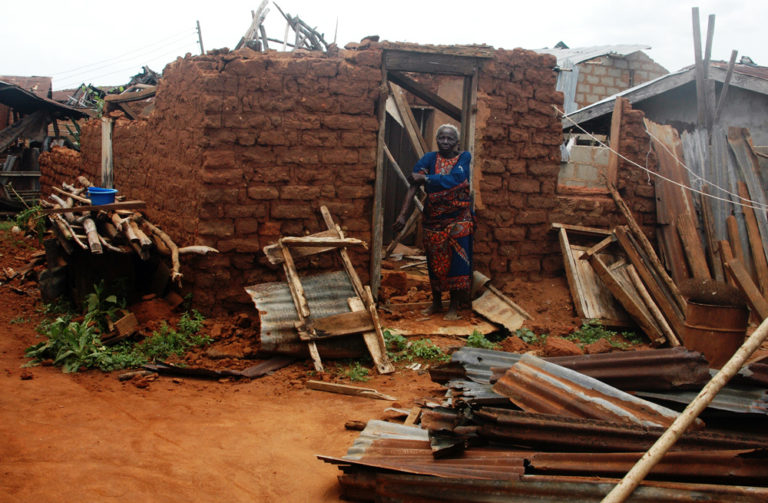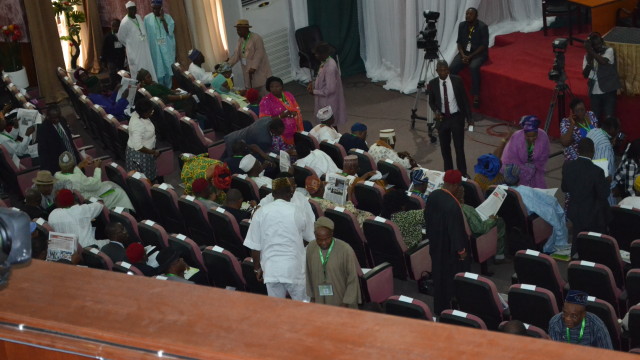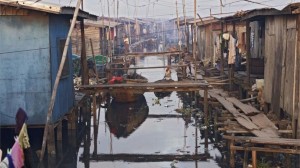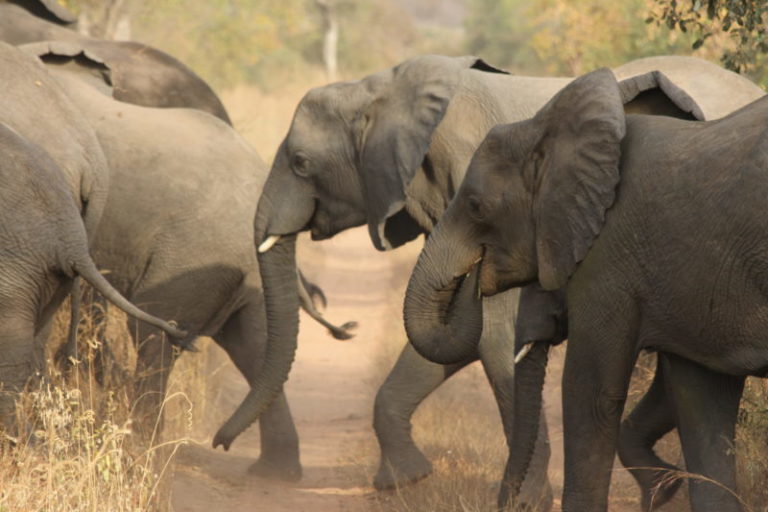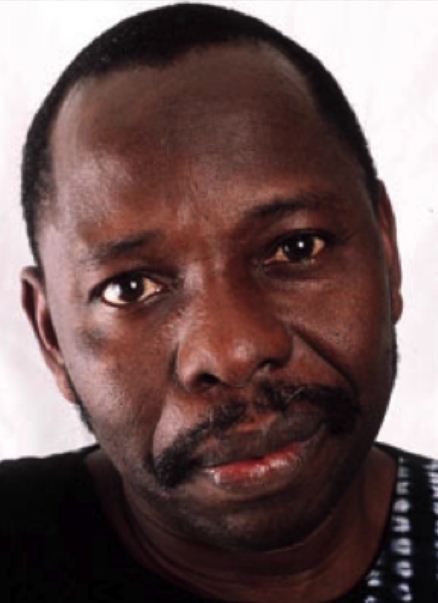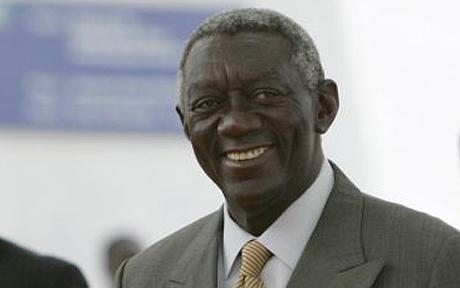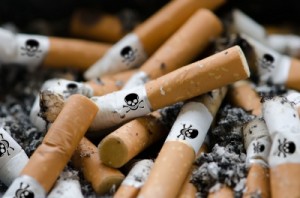 The Nigeria Tobacco Control Alliance (NTCA) has urged the National Assembly to fast-track work on the repackaged National Tobacco Control Bill. The NTCA Alliance Manager, Gbenga Adejuwon, made the submission in Lagos on Tuesday at a session to mark the 2014 World Tobacco Day (WTD).
The Nigeria Tobacco Control Alliance (NTCA) has urged the National Assembly to fast-track work on the repackaged National Tobacco Control Bill. The NTCA Alliance Manager, Gbenga Adejuwon, made the submission in Lagos on Tuesday at a session to mark the 2014 World Tobacco Day (WTD).
The WTD 2014 has “Raise Tobacco Taxes” as its theme.
Adejuwon commended the Federal Executive Council (FEC) for heeding the cries of Nigerians expressed in the mass media and a recent poll that confirmed that nine out of every 10 Nigerians sampled demand tough legislation to stop the British American Tobacco Nigeria (BATN) and other tobacco transnationals gambling with the lives of living Nigerians and those yet unborn.
Emphasising that the time to raise taxes on tobacco is now, Adejuwon said: “This global commemoration is one we feel we can use to re-echo our demands for heavy taxes that will discourage potential smokers and push the burden of tobacco health borne by our government at state and national levels back to the tobacco companies.”
According to the World Health Organisation (WHO), tobacco epidemic kills nearly six million people each year, of which more than 600,000 are non-smokers dying from breathing second-hand smoke. It further says that the epidemic will kill more than eight million people every year by 2030. More than 80 percent of these preventable deaths will be among people living in low- and middle-income countries like Nigeria, adds the global body.
Adejuwon described the recommendation on increasing taxes as a key endorsement of a WHO research, which confirmed that higher taxes are especially effective in reducing tobacco use among lower-income groups and in preventing young people from starting to smoke.
“A tax increase that jerks up tobacco prices by 10 percent decreases tobacco consumption by about four percent in high-income countries and by up to eight percent in most low- and middle-income countries,” he stated, adding that increasing excise taxes on tobacco is considered to be the most cost-effective tobacco control measure.
A recent WHO report also indicated that a 50 percent increase in tobacco excise taxes would generate a little more than $1.4 billion in additional funds in 22 low-income countries. It added that, if allocated to health, government health spending in these countries could increase by up to 50 percent.
“We strongly believe that the Nigerian government will be contributing to protecting present and future generations not only from the devastating health consequences due to tobacco, but also from the social, environmental and economic scourges of exposure to tobacco smoke by increasing taxes on tobacco products and then channeling generated funds into treating patients of tobacco-induced illnesses and other illnesses that currently lack adequate funding,” submitted Adejuwon.
Anti-tobacco group seeks speedy action on control bill
Groups analyse Lagos climate disaster
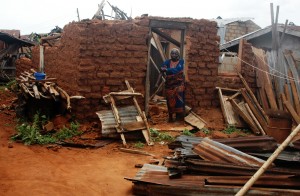
In 2012, Nigeria experienced remarkable floods that affected over 7.7 million people, causing the worlds’s second largest disaster-induced displacement event of the year.
The floods, which ravaged 3,850 communities across 256 Local Government Areas in 34 states out of the 36 states of the federation, inundated farmlands, destroyed over 618 houses and caused large damages to schools, health care centres, leaving about 2.1 million people internally displaced and causing 363 fatalities.
On 12 of February, 2012 in Lagos, a wind of terror with an estimated wind speed of 75km to 100km swept though the state, causing great havoc to infrastructures and human population. These somewhat extreme weather events resulted in multiple disasters for which the extent and magnitude of losses and damages are yet to be quantified.
The above scenario are some of the several painted by a coalition of civil society organisations (CSOs) in the draft Lagos Climate Disaster Analysis Report, which came under scrutiny recently by stakeholders.
Operating under the aegis of the Policy Advocacy Project Partnership on Climate Change in Lagos (PAPPCC), the groups pointed out that though the disasters may not be evidence of climate change but can nonetheless provide an indication of what the future potentially holds for a changing climate in Lagos (and other parts of the country). They predicted that impacts of climate change would pose significant threat to economic security, food security, health security, environmental security, personal security, community security and political security, which the state seems to lack adequate capacity to handle.
At a daylong validation workshop, participants attempted a review of the document, which features sections such as Background/Introduction; Climate Change and Disasters in Lagos State – An Overview; Transportation; Analysis of the Effect of Climate Change on Water Supply in Lagos State; Gender, Social Inclusion & Climate-induced Disasters; Climate Disasters & Infrastructural Development; Education; Preliminary Baseline Analysis of the Impact of Climate Change on Health & Economy: Lagos State in Focus; Analysis of the Effect of Climate Change on Agriculture in Lagos State; and Policy Recommendations.
On agriculture for instance, the report emphasised that variability in weather patterns including increase in rainfall, cessation of rainfall, and unpredictability of rainfall onset dates/season and cessation dates have disrupted the timing of farming operations for farmers in Lagos State like elsewhere in Nigeria, thereby reducing farming productivity.
The variability, it added, has caused confusion about the best time to plant or harvest crops, leading to reduction in cropping season, low germination, poor yield and crop failure, early or late harvest, with negative impact on the substance of farmers.
Unexpected increase in rain has also been linked to flash flooding and destruction of crops; increased soil erosion; higher incidence of crop and animal pests and diseases and overall decrease in agricultural productivity. This, noted the report, poses a serious challenge to the farming population of the state who depend on rain-fed farming for their subsistence.
Such impacts will further aggravate the stresses already associated with subsistence production, such as isolated location, small farm size, informal land tenure, low levels of technology and narrow employment options; in addition to unpredictable and uneven exposure to world markets that smallholder farmers particularly risk-prone.
Reduction in agricultural productivity in the state will continue to increase it’s dependence on other states and countries for its food security as well as increase the poverty level of the state’s rural dwellers, majority of who get their livelihood from farming, animal rearing, fishing or processing of agricultural products for sale.
Some of the CSOs involved in the initiative include: Community Conservation & Development Initiatives (CCDI), Centre for 21st Century Issues (C21st), Network on Water & Sanitation (NEWSAN), Development Initiative Network (DIN) and West African Network for Peace Building (WANEP).
Conference rejects special court, endorses resource democracy
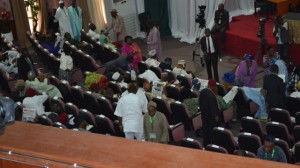
Applause and knocks last week greeted the report of the Committee on Environment when it was presented to the plenary session of the on-going National Conference in Abuja.
In particular, the committee’s recommendations demanding the removal of the Land Use Act from the 1999 Constitution and the establishment of a special court to deal with environmental issues received mixed reactions from various delegates, depending on which tribal grouping they belong.
Retired Justice Abdullahi Mustapha said it was appalling to realise that every agency of government wants establishment of special courts to handle its issues. He was of the opinion that existing courts have the capability to handle such issues if reformed and properly situated.
During the clause-by-clause consideration of the report and its recommendations, this suggestion was voted out.
Another recommendation that was hailed by some and condemned by others was the suggestion for resource democracy which it described as the right by the people to own and manage their resources by prospecting for and developing such resources in their territories.
This recommendation, in spite of the knocks it received from a section of the delegates, was retained by the Committee of the Whole during consideration of recommendations, through a voice vote.
Chairman of the Committee, Senator Florence Ita-Giwa, had while presenting the report said every decision arrived at was exhaustively researched and debated while experts in various areas of environment-related disciplines were invited for professional inputs and suggestions.
All the same, some of the delegates found faults in areas covered by the committee while others, like Ledum Mitee from Rivers State, pointed out factual errors and inconclusive analysis in specific areas.
Chief Edwin Clark, who turned 87 recently, said there was nothing new about most of the recommendations of the committee; explaining that what was lacking was the political will on the part of the leaders to accept suggestions and have them implemented.
He said: “We in the riverine areas, live on top of water but we have no water to drink. We cannot farm. We cannot do fishing. The vegetation has changed,” adding that pipelines that were laid in 1956 have grown old but remain unchanged.
The committee had in its analysis pointed out that climate change has already led to serious desertification in northern Nigeria, affecting at least 11 states with the serious implication of dislocation of populations and livelihoods.
It observed that southward migration of pastoralists in search of grazing grounds could well be one of the key factors leading to conflicts with farmers in other areas.
It recommend dedicated actions to save Lake Chad from complete disappearance while forest reserves should be established, protected and properly maintained by the both the federal and state governments.
The committee stated the need for government to encourage communities to imbibe the culture of tree planting, strict regulation and enforcement of logging activities and creation and proper funding of a reforestation and a forestation agency to handle all anti-desertification projects.
Dr Isaac Osuoka in his comments said the issue of desertification should be treated as an issue of national emergency so that the situation could be arrested before it gets out of hand.
Describing gas flaring as the most intractable of the petroleum industry related pollution, the committee said its stoppage has continued to remain elusive despite numerous attempts at regulation.
Ranked seventh in the world in terms of proven natural gas reserves, the committee reported that, apart from Russia, Nigeria flares more gas than any country of the world with 80% of the associated gas produced from Nigeria’s oil fields being flared.
The environmental impacts of this include increase in concentration of carbon dioxide and carbon monoxide in the atmosphere; negative effect on vegetation, livestock and aquatic lives in the vicinity of the flares, among others.
The committee recommended amendment of the Gas Re-Injection Act of 1979 and remove the provision that empowers the minister to authorise flaring of gas by oil companies; and that stiffer sanctions including fines equivalent to commercial price of natural gas should be imposed, while heads of offending agencies should be held responsible.
However, Mitee and Aishatu Isma’il faulted the recommendation in the sense that the committee failed to make gas flaring a crime in spite of its huge negative impact on the environment and humans.
Conference in session agreed that penalty for gas flaring should be paid to the affected communities and not to the Federal Government as has been the practice.
Oil spillage was another area of environmental pollution examined by the committee with a report that, to date, more than 5000 oil pipelines spill incidents have been reported in Nigeria with large areas of dry land, wetland and water bodies permanently impacted.
It cited a study carried out by the United Nations Environmental Programme (UNEP) stating that it would take a life-time for abandoned oil sites in Ogoni land to be cleaned up, a citation that was faulted by Mitee who said the report put the time frame at between 25 to 30 years and not a lifetime as reported.
However, the Conference resolved that Federal Government should, as a matter of national urgency, start implementation of UNEP report on Ogoni environmental problems without further delay.
Delegates also decided that a special agency be established by the Federal Government for the clean-up of the Niger Delta, particularly areas identified by international environmental bodies as badly affected by oil spills.
It suggested that the Act establishing the Nigerian Environmental Standards and Regulations Enforcement Agency (NASREA) should be amended to give it oversight over the entire environment including the oil and gas sector since, as presently operational, NASREA does not regulate the oil and gas sector.
In its recommendations, the committee stated that the vital need to preserve the integrity of the Nigerian environment and thus secure its sustainability for present and future generations requires clear and direct stipulations in the Nigerian Constitution.
It said, “As a people living very closely to and depending for livelihoods on nature, we should enshrine the rights of nature to maintain its natural cycles without disruption in our constitution.”
It stated further that although environment is fundamental to human existence, the 1999 Constitution made only a passing reference to the environment and environmental rights at its Section 20.
It recommended that for Nigerians to secure the environment and related rights, “this has to be placed among the fundamental rights section of the constitution and made fully justiciable.” The recommendation was upheld by the Conference.
It suggested that the power to legislate should without any ambiguity be given to the federating units; “the administration of the environment should be in the Concurrent List in the constitution,” since the constitution has not located the environment at all in its fiscal schedules.
Professor Obiora Ike in his contribution said the committee’s report was silent on the need to make education on environmental issues compulsory from the primary level; and that the committee was also silent on noise pollution.
Ambassador Adamu Aliyu also faulted the report in this regard and proposed that environmental issues should be taught in schools so that the younger generations would grow up conscious of the ills that certain actions bring on the environment.
DR Patricia Ogbonnaya was of the view that environmental education remains the only way to “catch them young” and should henceforth be made a part of school curriculum.
Mitee said the committee should have made a recommendation on the noise and fumes generated by electricity generating sets owned by people in the city; and also decide what should be done to control ordinary non-degrading wastes like unused water sachets and plastic and polythene containers. His suggestion was adopted by the Conference.
During consideration of report by the Committee of the Whole, the need for legislation on noise pollution and fumes from power generating sets and vehicles plying the roads were upheld and adopted.
It was also decided and adopted that agencies in environment sector should produce integrated information data on environment issues in the country to help in policy formulation and implementation.
The Conference also decided that henceforth, the Ecological Fund Office should be moved from the Presidency to the Federal Ministry of Environment and must ensure that the Fund is specifically used to address ecological problems.
It was agreed that communities within the National Park areas across the country are to be resettled in line with the laws establishing the parks.
In a bid to control flood and its devastating effect on humans and livelihood, Conference agreed that two new dams be built in the lower end of River Niger; and that flooding be declared as annual natural disaster in the areas they are likely to occur.
Makoko claims no easy victories


Makoko is a metaphor for resilience in the face of enormous pressures. This community floating on the waters of the Lagos Lagoon is resilient because it is not a rigid community. It is resilient not because the buildings in this community are the strongest in the world but because they are built in sync with nature and not against her. Her resilience is seen in the young boys and girls who ferry us in the boat taxis in order to make enough cash to pay their daily school fees and so access a measure of education.
The intense pressure the communities that make up Makoko have had to confront is best told by the people themselves and not by observers. However, beyond their voices and cries observers are able to see the stumps that poke above the waters of the Lagoon in silent testimony to brutal assaults and fires that seek to demolish, dislocate or erase the community.
Makoko is a community loaded with lessons that we can only deny to our peril. Makoko is a laboratory of life. It is a community of possibilities. Makoko gives hope. It also raises challenges. This is why we have chosen to assembly for our dialogue in this structure. In this series of HOMEF’s Sustainability Academy, we are interrogating the evident conflicts and turmoil manifesting across the world. We have looked at armed insurgency, economic violence and ecological assaults. We will continue with this at this final lap. Two additional dimensions here will be those conflicts generated by, and expected from, global warming and those generated by forces of disaster capitalism.
Makoko as a community sitting on water is prone to the impacts of sea level rise that could be triggered by intense rains or by global warming. Flooding is a challenge to Lagos, any day and the state pays a lot of attention to building resilience and also mitigating the impacts. However, Makoko teases the sea by sitting on it. The Floating School in which this session is being held speaks volumes about how to face sea level rise and deflect its sting. The School is designed and built to float. This means that if the sea rises, the building itself rises. This school is designed and built with in line with the rhythms of nature and not in defiance of nature like Eko Atlantic does, for instance. The Floating School and the entire Makoko communities show us what resilience means.
Capitalism has entered the cannibal stage where it feeds more blatantly on disaster. Not content on accumulation by dispossession, when disasters happen today they are seen as opportunities to displace citizens from their ancestral abodes and not as emergency calls to help the victims to overcome their plight. Thus, if a fire breaks out in a community such as Makoko, those who see the location as prime property, would wish to pour fuel on the fire rather than fight to quench it. This displacement for acquisition trend is not restricted to Makoko, but is a common challenge that shoreline communities are facing from desperate speculators.
The world acknowledges that global warming is real, and that dependency on fossil fuels is a critical contributor to the menace. Yet there is no desire to shift away from the bad habit that is sure to bring on catastrophic global warming. The allure of the fossil dependency is not just in the fact that they make energy much easily available than other energy forms. More importantly, the attraction comes from the fact that fossil fuels are extracted without responsibility, or care for the environment, and that they are money-spinners for governments, oil and other hydrocarbon companies and provide the necessary power for rampaging war machines.
While Makoko is an affront to those who desire her beautiful location, she is a great inspiration for those who believe that progress can only be progress if it is in line with the desires of the people and generally supports life. The Floating School is a concept we believe should be replicated in all communities on the coastline of Nigeria and elsewhere.
As we round up this third session of our third Sustainability Academy we will continue to look at Turmoil in Africa and ask if these constitute Uprisings or whether we are seeing a descent into Chaos. Before we introduce our Instigator for this session, HOMEF would reiterate our key calls relative to the issues we have been interrogating as follows:
- African leaders must ensure that the continent gets out of the trap of being the arena for proxy wars by interests inimical to the well being of our environment and peoples
- Ecological warfare must not be a tool in the war against terror. In this regard HOMEF endorses the demand: #BringBackOurGirls and adds that they must be brought back to a secure environment devoid of stigmatisation and exploitation in any guise including exploitation as child brides.
- Nigerian and African leaders must protect our environment and peoples from the activities of rampaging resource extractors, ensure that environmental costs do not continue to be externalised to the people/environment and that ecological crimes are severely sanctioned
- African governments must be primarily responsible and accountable to our peoples rather than to international financial institutions and to multinational corporations
- The Nigerian government should scrap the Hydrocarbon Pollution Restoration Project (HYPREP) and replace it with a National Environmental Restoration Agency (NERA) under the Federal Ministry of Environment, with a mandate to clean up the Nigerian environment including in particular the Ogoni environment as demanded by the United Nations Environment Programme (UNEP) report issued three years ago
- The Makoko Floating School model should be adopted and replicated across all coastal communities by the Nigerian government as a climate change adaptation measure and to teach the lesson that our architecture must support our ways of life and be in sync with the rhythms of nature
- The Nigerian and Lagos State governments should commit to upgrade the Makoko communities and provide support for the communities including by providing adequate health, educational and other services. The community should also be protected from property and financial speculators as well as from other disaster capitalists.
By Nnimmo Bassey (Director, Health of Mother Earth Foundation – HOMEF)
Boko Haram, ecological scourge and Africa’s uprisings
 The conflicts in Africa are both echoes and memories of past turmoil on the continent. While we can hazard a guess that we know where we are coming from, the question of where current events will lead, and if that is where we desire to go, remain open. Africa has the challenge of characterisation in the eyes of the world. When she is not presented as a continent of hungry or malnourished people, she is shown as a continent perpetually enmeshed in violent conflicts. The fact that these are often overstated does not diminish the urgent need to ensure that we understand these events, confront and eliminate them.
The conflicts in Africa are both echoes and memories of past turmoil on the continent. While we can hazard a guess that we know where we are coming from, the question of where current events will lead, and if that is where we desire to go, remain open. Africa has the challenge of characterisation in the eyes of the world. When she is not presented as a continent of hungry or malnourished people, she is shown as a continent perpetually enmeshed in violent conflicts. The fact that these are often overstated does not diminish the urgent need to ensure that we understand these events, confront and eliminate them.
Africa is rich. This wealth has constituted the core of the problem confronting the continent and has provided the environment for proxy wars and some of the most horrific resource wars in the world. Some wars were justified, especially the wars for independence waged by heroic revolutionaries with an alternative dream for the continent – diametrically opposed to the kleptomaniacs that grabbed the reins of power on the ashes of the immediate post colonial structures.
Conflicts peaked in the continent in 1989 when there were nine full-blown wars and in 1991/1992, which had eight wars. Today, we have fewer wars on the scale of those of the 1980s and early 1990s. Interestingly, by comparison, there are more wars in Asia,than there are in Africa when taken on a per country basis. However, we are at a time of tremendous uprisings. These uprisings include what has come to be bogusly known as the Arab Spring – including especially the one that started from Tunisia and spread to Egypt, Libya and elsewhere. Some people have snidely argued that we are now seeing an Arab winter.
The January 2012 uprising in Nigeria in opposition to increases in price of petroleum products was a significant political response by oppressed citizens. Official critics of that uprising preferred to interpret the citizens’ revolt as having been orchestrated by the car-owning middle class rather than as a reaction by the poor who are deeply impacted by a lack of basic energy and social services that leaves them struggling to obtain these basic necessities for livelihoods.
Of course we cannot forget the 2005-2009 armed resistance in the oil fields of the Niger Delta and the demands that undergirded it. Neither can we ignore the high number of protests in South Africa, including the Marikina incident where miners that asked for living wages got cut down in a hail of bullets instead. That incident demonstrated how dispensable labour has become in this era of neo-colonial and rabidly neo-liberal economics. It underscored the downgraded cost of the reproduction of labour.
The end of armed conflict in the Niger Delta has not brought about the end of military propelled ecological assaults. The catalogue of bombed-out bush refineries and crude-oil-aden Cotonou boats that the military chalk up as successes are actually major contributors to horrendous environmental pollution. Added to the regular oil spills, toxic waste dumping and gas flaring, the violence in the oil fields continues unabated.
Agreeing that Africa is not a war-endemic continent does not diminish the nightmares that conflicts such as those engendered by Boko Haram bring to Nigeria, and the region. These conflicts raise other fundamental issues that are of deep concern to us and should be of concern to all.
Resource wars hardly ever translate to halting the exploitation of the resources while the conflicts rage. Exploitation continues without regulation or control during periods of conflicts and the lack of accountability and responsibility sometimes constitute the real impetus for conflicts. The beneficiaries of resource wars include the armament merchants, the resource exploiters and the complicit political heads of marauding gangs and governments. And so we hear of blood diamonds. And we should also talk of blood crude oil, blood gold and blood timber.
What do these conflicts mean for the ecological state of the continent? In the long list we will find environmental degradation. Recently, some people suggested deforestation as a way of flushing Boko Haram out of the Samisa Forest following the dastardly abducting of over 200 young girls at Chibok. The US military tried that method of warfare using highly toxic Agent Orange manufactured by Monsanto and Dow Chemicals from 1961 to1971 in Northern Vietnam. The scars on people and the environment remain till now.
Oronto Douglas, the Special Adviser to the President on Documentation and Strategy, argued in his incisive article Bring back the Book, the Letters and Our Girls! that the anger over the abduction of the young Chibok girls should not be frozen at such a level that would see the global disgust dissipate the moment the girls are rescued. He rightly mentioned that this is the right time to dig into the root causes of the marginalisation of female folks in the country, including issues of child brides, VVF, discriminatory access to education and other factors that could make abduction and threat of selling young girls even conceivable, not to mention as something to brag about.
Can a movement against violence become a movement for social, economic and environmental justice? We would waste a great opportunity if we stop at just the massive hashtag-and-photo-shoot campaigns. This is a great moment to build an issues-centred political movement in Nigeria and in Africa. It is time to go beyond the hastag.
Wars kill not only directly through bullets and bombs but also through diseases, destruction of the environment and livelihoods, increase in violent crimes, displacement of populations and unsustainable exploitation of resources. Conflicts also open possibilities for the re-colonisation of the continent, on our invitation, in the guise of military and economic assistance. We are seeing this unfolding in our nation and in other nations of Africa.
In an effort to engender interrogations and interpretation of current uprisings in Africa, Health of Mother Earth Foundation (HOMEF) hosts her third Sustainability Academy titled Turmoil in Africa: Uprising or Chaos? The Instigator, Firoze Manji, of ThoughtWorks and the Pan African Institute, has done deep work on the issue and he is in an excellent position to lead. He facilitated (and co-edited) the publication of Claim No Easy Victories – The Legacy of Amilcar Cabral as well as Silence Would Be Treason- The Last Writings of Ken Saro-Wiwa. He is here to help us make sense of the battles raging or smouldering around us and to fathom the changing nature and objectives of such uprisings. Let us begin the interrogations.
By Nnimmo Bassey (Director, Health of Mother Earth Foundation – HOMEF)
Cross River community moves to save endangered primates
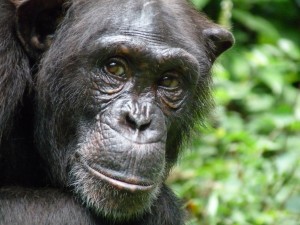 The Nigeria-Cameroon chimpanzee is the rarest and most endangered of four sub-species of chimpanzee currently found in Africa. Man’s closest living relative, the ape, is fully protected by Nigerian law, and now by communities also.
The Nigeria-Cameroon chimpanzee is the rarest and most endangered of four sub-species of chimpanzee currently found in Africa. Man’s closest living relative, the ape, is fully protected by Nigerian law, and now by communities also.
When a chimpanzee was recently killed by a hunter in the Mbe Mountains, the entire community of Bamba in Boki LGA, Cross River State, rose up in revolt to protest. Led by their able chief, Vincent O. Mkpe, the community quickly identified the hunter responsible for this heinous act as Ubua Stanley, and he was duly arrested.
A joint team from the Governor’s Task Force on Anti-Deforestation and the Cross River State Forestry Commission immediately travelled to the village, ensuring that the culprit appeared before the magistrate in Obubra in less than 24 hours. Justice was indeed swift and, using the newly revised forestry and wildlife law of Cross River State (2010), the man was sentenced to one year imprisonment with the option of a N100,000 fine.
An upcoming tourist destination, the Mbe Mountains are traditionally owned by the nine communities that surround the mountain. The area is managed for conservation and development by the Conservation Association of the Mbe Mountains (CAMM) with support from the Wildlife Conservation Society (WCS), and is home to other rare and endangered species such as the Cross River gorilla in addition to the Nigeria-Cameroon chimpanzee.
The importance of the Mbe Mountains as a wildlife haven, and a source of pride for Cross River State, has not gone unnoticed. Bamba the Gorilla was recently unveiled as the official mascot and logo for the 19th National Sports Festival scheduled for Calabar in November 2014.
WCS to manage Nigeria elephants reserve

The Wildlife Conservation Society (WCS) has announced that it will partner with the Bauchi State Government to manage the conservation of Yankari Game Reserve, a key protected area in Nigeria that contains the largest remaining population of elephants in the nation and one of the largest in West Africa.
WCS signed a four-year MOU with officials in Bauchi State to manage conservation work in Yankari, considered the nation’s richest protected area.
The reserve contains an estimated 350 elephants – the only viable population remaining in Nigeria. In addition, the 866-square-mile (2,244 square kilometers) reserve supports important populations of lion, buffalo, hippo, roan and hartebeest.
Originally created as a game reserve in 1956, Yankari was upgraded to a national park in 1991. It was managed by the National Parks Service until 2006 when responsibility for the management of the reserve was handed back to Bauchi State Government. Since then tourism infrastructure has been dramatically improved. Yankari is now one of the most popular tourism destinations in Nigeria.
Support from WCS began in 2009. Since then protection of wildlife has improved although hunting and grazing of livestock within the reserve has not yet been brought under full control. Furthermore unconfirmed reports suggest that an unknown number of elephants may have been killed in recent years to supply Nigeria’s illegal trade in ivory.
In addition to the funds provided by Bauchi State Government under the terms of the MOU, WCS’s 96 Elephants campaign will also provide funding and support for regular anti-poaching patrols in Yankari including equipment and training.
“Yankari Game Reserve is an ecological gem of West Africa,” said Dr. James Deutsch, Executive Director of WCS’s Africa Programme. “We are extremely proud to be entrusted with preserving this critically important wildlife area by the Governor of Bauchi State, Malam Isa Yuguda, for the benefit of the people of Bauchi State and Nigeria.”
Based at the Bronx Zoo, the WCS harnesses the power of its Global Conservation Programme in more than 60 nations and in all the world’s oceans and its five wildlife parks in New York City, visited by four million people annually. WCS combines its expertise in the field, zoos, and aquarium to achieve its conservation mission, which is to save wildlife and wild places worldwide through science, conservation action, education, and inspiring people to value nature
Saro-Wiwa: Keeping silent is treason
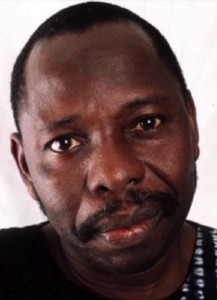
At the occasion of third Sustainability Academy of Health of Mother Earth Foundation (HOMEF), Director of HOMEF, Nnimmo Bassey, in Bori, Ogoni pays tribute to late environmental activist, Ken Saro-Wiwa
When Ken Saro-Wiwa wrote that silence was tantamount to treason he knew what he was saying. When he declared in the dock that We All Stand Before History, he was as prescient as any prophet could be.
Today, we see clearly that keeping silent in the face of ecological destruction is treason. Keeping silent while the environment and the people die is not just being callous but is plain treason. He knew the vision of the Ogonis and had no doubts about his mission. He endured personal insults, attacks and pains. He took all that because he desired to see a democratic Nigerian nation where no group or individual is marginalised and where everyone lives in dignity in an environment that is safe and supportive of livelihoods. In the Pantheon of great African and global leaders and although he was not a president of a nation he sits well alongside great visionary African leaders.
Ken Saro-Wiwa was a man of many dreams. He was murdered, but as is universally accepted, even if you kill the messenger, you cannot kill the dream. Today, we are gathered here to interrogate the turmoil in Africa and seek to find out what the roots are and whether there is are common factors connecting them. We want to ask the questions: when, where and why did the rain begin to drench us. How could storm clouds gather and yet we say there would be no rain?
One of the regrets of Ken Saro-Wiwa was that he and the Ogoni leaders in the struggle in the early 1990s had not invested enough time in training up cadres and upcoming leaders. He stated this in a number of ways in the communications he was able to smuggle out of prison. He read this in the very last letter he wrote while in detention and which is included in Silence Would Be Treason – The Last Writings of Ken Saro-Wiwa, a book we are proud to present to you today in this historic Ogoni capital city, Bori. Permit me to quote him on this:
“One source of worry is what will happen to our struggle when Ledum and I are put away. We had not had enough time to train the cadres or put alternative leaderships in place. And putting members of the Steering Committee on the police wanted list has deprived us of a lot of hands. I have been able to direct things and even contribute to the publicity war from detention. I don’t know if I’ll be able to do so from prison. We have no funds, not even a bank account. Everything had hinged so much upon my resources that my absence will cause a lot of problems. We’ll have to get around that somehow.”
It is inspiring to see that the seeds sown by the martyrs of the Ogoni struggle continue to fire the imaginations of the marginalised peoples of the world and all those engaged in the epic battles for ecological sanity. Saro-Wiwa was an apostle of peaceful resistance and like others before him the arrows aimed at him by agents of multinational corporations and the governments that polish their bloody shoes did not cow him. His vision of an Ogoni ethnic nation of proud and dignified peoples lives on. Today, everyone sees the Ogonis and marvel at the tenacity with which you all are committed to peaceful resistance in the face of ecological provocations and extreme pressures including those of land grabbing and outright violence.
It is heart warming that the Movement for the Survival of the Ogoni People (MOSOP) continues to hold up the banner announcing the possibilities of a restored Ogoni environment, attainment of political and economic emancipation of our peoples and securing our collective dignity as peoples. We see other organisations working towards the same ends in Ogoni and in other parts of the Niger Delta and the entire Nigerian nation and we dare to believe that the labour of our heroes past will never be in vain indeed.
On 4 August 2014, it will be three years since the United Nations Environment Programme (UNEP) issued its damning report on the state of the Ogoni environment. The report uncovered that the Ogoni environment has been so damaged that rather than support lives and livelihoods, it was killing the Ogoni people. The UNEP report confirmed the alarming fact that all the water bodies in Ogoni are polluted with hydrocarbons and a variety of deadly elements including carcinogens. The pollution is so deep that it would require 25 years of work to decontaminate the waters so that people can safely drink and use the resources found in them. The report also revealed that the land in Ogoni is polluted to a depth of five metres in several places and would require five years to clean up before the waters can be cleaned.
Ken Saro-Wiwa declared that what was happening in Ogoni was an ecological war. That may have appeared as a very strong way to describe the situation, but you and I agree that he has been vindicated. That war is not over. It will not be over until our children can safely swim again in our rivers and creeks. It will not be over until our people can fish, collect crabs, periwinkles and other seafood and eat them with assurance of nourishment and not death by instalment. The ecological war will not be over until our farmers can plant and harvest yams and cassavas that are safe to eat and are not covered in hydrocarbon pollutants. The ecological war in still on! It must stop!
The ecological war remains on as the days go by and the UNEP report remains unimplemented in a real sense. Erecting signposts reminding us that our communities are polluted does not say where our people should relocate to or whether the contaminants are being cleared. Surely three years is enough for any serious work to have commenced on the detoxification of Ogoni environment.
The UNEP report was an alarm bell signifying that the petroleum sector’s footprint in the Niger Delta is deadly and cannot be ignored. The harm done cannot be wished away. It must be confronted and dealt with. The ecological war in still on! It can be stopped!
The same can be said of the polluting extractive activities in other parts of Nigeria and indeed Africa. The tin mines of Plateau State were abandoned without decommissioning. The environment remains toxic and over 1,100 sinkholes there continue to pose grave danger to man and beasts. The environment of the coalmines of Enugu and Kogi States begs for restoration. The same is the situation with the gold mines of Obuasi, Ghana, the coal mines of Witbank in South Africa and the diamond mines of Kono in Sierra Leone, to mention a few.
Many of the conflicts in Africa do not happen because we are bloodthirsty tribal peoples that are always at conflict with ourselves. No. Many are proxy wars fought on the behalf of agents of resource expropriation and transnational resource thieves. Outright wars and terror across the continent are fought so that arms merchants can ply their bloody trade while our peoples wave weapons produced by merchants of death who laugh all the way to the bank while we abduct young girls, kill children in their sleep, burn down villages and soak in the blood of our children, mothers and fathers.
How climate change hurts Ghana, by Kuffour
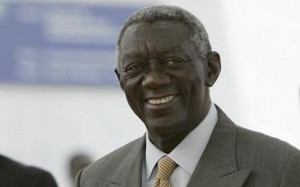
“Climate Change is like some feet that creeps on a family in the dead of the night and wraps around the members entangling them in ways in which they cannot free themselves. Climate change events have become so complex and uncertain that the developed nations are at loss as to how to predict related events. Climate change is now an issue for survival as it threatens the survival of our world.”
Those were the vivid words of UN Secretary General’s Special Envoy on Climate Change, President John Agyekum Kuffour during the African regional launch in Accra, Ghana of the “Guidebook for Journalists on Climate Change in Africa held May 20th, 2014.
The erstwhile Ghanaian leader, who has taken up a new assignment since December to give a political touch to the on-going global efforts to address climate change, lamented the scourge in his home country.
His words: “Climate change is essentially a rebound of nature on us. In Ghana, our problem is the indescribable destruction of our forests. We did not intend evil; but in our ignorance we thought we were just making money. Now, our forests are drastically reduced and we need to quickly step up our afforestation efforts. Afforestation should be given priority attention in this country.
“Accra is now congested because the city that was created for one million people 20 years ago, is now inhabited by over seven million people and this is creating all kinds of climate change-related problems. Agriculture is suffering because of unpredictable rains these days. Farmers can no longer tell the right time to plant like they used to do some years back. Indeed, climate change is devastating countries and changing lifestyles.”
Stressing that “everybody is at risk and so everybody must be educated,” he described the media as a major disseminator of information with a major role to play in the education drive. He wants every aspect of the media – radio, television, newspapers, on-line, drama – engaged to spread the news about climate change.
“The media’s contribution will be to send out the message in ways that policy makers and politicians will appreciate the issues at stake and give climate change appropriate attention. We need to exploit natural resources in a responsible manner – we must pump oil responsibly and flare gas responsibly because of their implications for climate change. We need to explore green and sustainable sources of livelihood that can make our economies vibrant. I urge the media to use the Guidebook on Climate Change in Africa like a Bible.”
UN Resident Coordinator in Ghana, Susan Namondo Ngongi, warned that, if not addressed, the impacts of climate change would be magnified by underlying conditions of governance, poverty and resource management as well as the nature of impact at local and regional levels.
To respond, proactive efforts at all levels and by all stakeholders are required to lessen the harm of climate change impact and its effects on society and the environment, she added.
“There is urgent need for policy, economic and social oriented actions to address this problem. Important policy related instruments include the integrated policies which include climate change as a factor in broader policy development to facilitate implementation of mitigation mechanisms, regulatory standards that provide certainty and consistency on emissions levels, and send a clear signal that discourages a ‘business as usual’ approach,” Ngongi declared.
Minister for Education and Chairman of the Ghana National Commission for UNESCO, Prof. Naana Jane Opoku-Agyemang, declared that climate change is upon the world and “we need global solutions, even though each country, regardless its status has role to play. Therefore transmission of accurate information is critical.”
She said: “The climate affects all life: human, animal, plan, water and more. It also affects culture and ways of seeing, since certainties would have shifted. But in this challenge there might also be opportunities for innovation and adaptability.
“In view of the above, ladies and gentlemen, progress is needed on many fronts especially for Africa: the development and transfer of green technologies; greenhouse gas emission reduction and the establishment and implementation of effective government policies. It is of equal importance to provide education and training and promote public awareness to the broadest audience possible with the right information. The need to create and inform global citizenry on their roles in climate change mitigation and adaptation is immediate.”
President, Ghana Journalists Association (GJA), Dr Affail Monney, believes that the most critical need of journalists now is neither the fattest pay cheque, a swanky car, nor a palatial home, but capacity building. According to him, the perpetration of mediocrity and other professional diseases can be best cured through capacity building.
“The Guidebook on Climate Change in Africa has therefore come at the right time not only to help capacitate journalists but also to expand the scope of coverage and improve the quality of stories on climate change,” he stated, adding that journalists of this generation have a responsibility imposed by destiny to deepen their understanding of issues on the environment and help contain the ravages of the weather as a result of environmental abuse and bankruptcy.
He said, “The Bible, which to believers is a perennial spring of wisdom and infallible guide, teaches us in Mathew 15:14 that if a blind man leads a blind man, both will fall into a pit. Never should journalists of today be accused of professional blindness due to ignorance, misreporting or under reporting the environment. Rather, journalists must be on top of issues and as a professional bible internalise and reflect the guidelines in their reports, analyses, features, commentaries and documentaries to justify the investment made in publishing them.
“The GJA thanks UNESCO, the International Institute for the Environment and Development (IIED) as well as the Earth Journalists Network (EJN) for their role to train journalists. The GJA is eternally grateful for this guidebook of professional quality and inestimable value.”
Gas flare-out: Mallam commends Total’s commitment
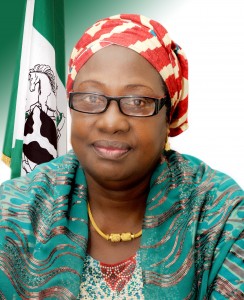
Minister of Environment, Laurentia Laraba Mallam, has commended French oil and gas giant, Total, over its determination to be the first multinational oil corporation to stop offshore gas flaring in Nigeria.
Speaking through her Press Secretary and Deputy Director Information, Ben Bem Goong, from far away Cancun, Mexico, while participating in the Global Environment Facility (GEF) Assembly, the minister noted that the efforts of Total in this direction are worthy of commendation, adding that other oil companies operating in Nigeria should follow the firm’s good example and environment-friendly approach.
Acknowledging the devastating consequences of gas flaring on the environment, including global warming and ozone depletion, Mallam asked oil companies operating in the country to see gas flaring as a challenge to the entire world and not just a Nigeria problem, adding that the ecosystem is indivisible.
The minister was reacting to the pronouncement by high level officials of Total at its headquarters in Paris, France where the corporation hosted journalists.
Mallam was in Cancun, Mexico as the head of Nigerian delegation to the GEF Assembly, where she presented the country’s position to the 182-member Assembly on the review of the facilities operational structure as well as its general policies and programmes.
Shortly before she left for Mexico, the minister played host to the Mexican Ambassador in her office in Abuja, informing the latter that she would use the opportunity offered by the Assembly to explore possible areas of strengthening bilateral relations between Nigeria and Mexico, most especially on environmental issues such as climate change, biodiversity conservation, sustainable forest management, pollution control and ozone layer depletion substances.
She noted that her resolve to personally lead the delegation was informed by the significance of the 5th edition of the Assembly coming after the successful replenishment negotiations with over 30 countries pledging well over $4.25 billion to fund projects in member countries, which have global environmental importance in the next four years.
According to the minister, the meeting evaluated and reviewed general policies as well as the Facilities’ Operational Structure.
Mallam revealed that the GEF is currently the most important source of financing for projects aimed at improving the Global environment.
In his address to the minister, the Mexican Ambassador to Nigeria, the second since the establishment of the Mexican Embassy in Nigeria over five years ago, Ambassador Marco Blanco, said that his country was interested in expanding the frontiers of bilateral relations with Nigeria, maintaining that the environment sector offers a veritable platform for cooperation between the two countries.
Presenting some statistics on his country, Blanco noted that the Spanish speaking country has an estimated population of 120 million people, with 42 Free Trade agreements, adding that Mexico ranks as the 10th most visited country globally.
With similar demographic (population) and economic characteristics, Blanco noted that Mexico and Nigeria have similar environmental challenges which they can confront together for the benefit of their own people.


